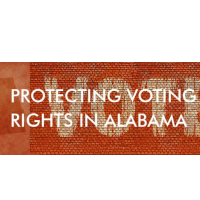Supreme Court Votes 5-4 that Alabama’s Redistricting is Unfair to Black Voters
 (graphic: NAACP)
(graphic: NAACP)
The U.S. Supreme Court ruled Wednesday that a lower court should re-evaluate a redistricting plan put in place by the Republican-dominated Alabama legislature that packed supermajorities of black voters into just a few districts.
The redistricting plan of 2010 sought to maintain the number of districts in which African-Americans were a majority of voters and thus maintain a percentage of state representatives in line with the black population as a whole. However, those drawing the lines packed supermajorities of black voters into those districts, diluting their votes and removing the possibility of black voters having influence in more heavily white districts.
Although 26% of Alabamans are black, only 5 of 35 state senators, or 14%, are black.
“[M]inority packing and reliance on the Voting Rights Act have become a familiar tool for Republican legislatures looking to gain advantage by packing likely Democratic voters into a smaller number of districts. Many Democrats and minority voters have challenged such plans as unconstitutional racial gerrymanders,” Richard Hasen wrote at ScotusBlog.
The lower court ruled in the suit brought in part by the Alabama legislature’s black caucus that the redistricting plan wasn’t a gerrymander prohibited by law, but it looked at the whole state. The Supreme Court ruled (pdf) that the lower court should look at each district individually to decide if there were illegal gerrymanders there as well. In Justice Stephen Breyer’s opinion, the court suggested that at least some of the districts were unconstitutional gerrymanders drawn as a result of the state’s incorrectly held belief that it was required to maintain the same percentage of black voters in a district as before the redistricting.
“For example, once the legislature’s ‘equal population’ objectives are put to the side—i.e., seen as a background principle—then there is strong, perhaps overwhelming evidence that race did predominate as a factor when the legislature drew the boundaries of Senate District 26, the one district the parties have discussed here in depth,” Breyer wrote.
A dissent written for the minority by Justice Antonin Scalia called the majority “fantastical” in its “sweeping holding that will have profound implications for the constitutional ideal of one person, one vote, for the future of the Voting Rights Act of 1965, and for the primacy of the State in managing its own elections.”
Whether the case results in more political power for black voters is still in doubt. Alabama will probably be forced to draw some new districts, but the state will probably find a way to draw them in such a way that Republicans are able to maintain their control over the state’s legislature, Hasen concluded.
-Steve Straehley
To Learn More:
A Small Victory for Minority Voters, Or a Case With “Profound” Constitutional Implications? (by Richard Hasen, ScotusBlog)
Supreme Court Hands Win to Opponents of Alabama Redistricting Plan (by Robert Barnes, Washington Post)
SCOTUS Throws Out Ala. Redistricting Plan (by Jack Bouboushian, Courthouse News Service)
Alabama Legislative Black Caucus, et. al., vs. Alabama, et. al. (U.S. Supreme Court) (pdf)
- Top Stories
- Unusual News
- Where is the Money Going?
- Controversies
- U.S. and the World
- Appointments and Resignations
- Latest News
- Trump Orders ICE and Border Patrol to Kill More Protestors
- Trump Renames National Football League National Trump League
- Trump to Stop Deportations If…
- Trump Denounces World Series
- What If China Invaded the United States?






Comments